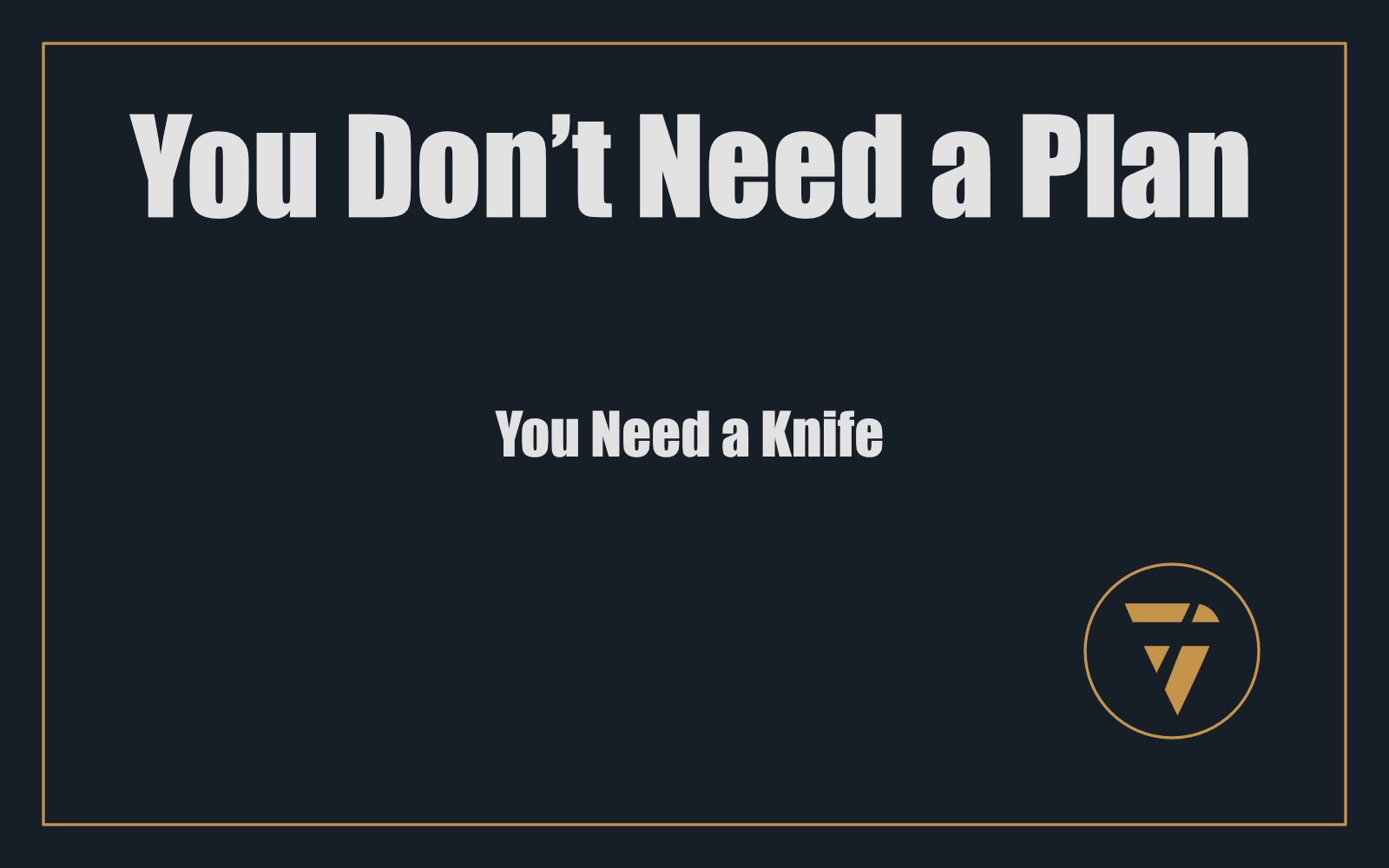You Don’t Need a Plan

You Need a Knife
You’ve been tricked into believing strategy is a game of adding layers: more plans, more slides, more analyses. You think if you stack enough ideas, diagrams, and scenarios together, clarity will emerge from the sheer weight of your diligence.
It won’t.
Most of what you call “strategy” is actually delay dressed in sophistication. Your careful planning sessions, endless iterations, and neatly organized documentation are camouflage—protection against admitting the brutal truth you refuse to face:
Your business doesn’t need another plan.
It needs a knife.
Because clarity never comes from accumulation. It comes from removal. Strategy, at its core, is the ruthless, intentional deletion of everything that distracts, dilutes, and delays your progress.
Here’s the real reason you’re trapped in perpetual planning:
You’re afraid of what happens when the plan ends and action begins. Because action—real, irreversible action—demands cutting away what’s comfortable, safe, and familiar. It demands you face the cost of deletion: relationships that no longer serve, products that no longer perform, processes that create motion but never momentum.
You’ve confused strategy with safety.
You’ve mistaken complexity for clarity.
You’ve hidden behind the elegance of your plan because you fear the violence of decisive deletion.
But planning isn’t safe. Planning is expensive. Every day spent strategising instead of deleting adds layers of confusion, friction, and drift. You don’t need another framework—you need the surgical precision of ruthless removal.
Here’s what the knife cuts out first:
1. Optionality
You think keeping options open is strategic. It’s not—it’s hesitation disguised as prudence. Optionality multiplies complexity, creating endless loops of analysis and paralyzing indecision. Every option you leave open is permission to delay.
Instead:
- Identify what outcome you will NOT pursue.
- Delete immediately. Commit visibly.
- Remove fallback plans entirely. Leave yourself no safety net.
Strategy isn’t options. It’s committing to the singular path that matters most.
2. Incrementalism
Incremental progress feels safe because it demands little risk. But incrementalism is precisely why you’re stuck—crawling forward inch-by-inch, afraid of the bold, brutal leap that creates permanent momentum.
Instead:
- Set a target that’s intentionally uncomfortable.
- Delete any initiative that doesn't force rapid leaps.
- Reward speed, not comfort. Reward disruption, not incremental safety.
Strategy isn’t incremental. It’s aggressively structural leaps forward.
3. Legacy Commitments
Your business is burdened by yesterday’s promises, old clients, outdated products, legacy processes. You hold onto them because deletion feels like loss. But it’s the opposite. It’s liberation.
Instead:
- List every legacy commitment still draining your resources.
- Delete aggressively. Fire misaligned clients, discontinue stale products, terminate outdated contracts immediately.
Strategy isn’t protecting legacy—it’s aggressively dismantling it.
4. Ambiguity
Ambiguity is the silent enemy of strategy. Your vague goals, undefined metrics, and fuzzy responsibilities make drift inevitable. Ambiguity survives because you fear the confrontation clarity demands.
Instead:
- Identify exactly what success looks like in tangible, immediate terms.
- Delete every goal, KPI, or metric that doesn’t have direct, visible consequence.
- Assign singular accountability—no shared roles, no unclear mandates.
Strategy isn’t ambiguity. It’s ruthless, binary clarity.
5. Unproductive Relationships
You tolerate underperformance from your team, clients, and partners because confrontation feels uncomfortable. But strategy demands immediate deletion of weak links.
Instead:
- Delete toxic clients immediately.
- Replace or remove underperforming team members.
- Refuse meetings with anyone who doesn’t directly contribute to momentum.
Strategy is unapologetically exclusionary.
Here’s how you wield the knife strategically and decisively:
Step 1: Conduct a Deletion Audit
Your first task is brutal honesty. Ask yourself explicitly:
- Which projects produce motion without momentum?
- Which clients drain more value than they create?
- Which systems exist because of habit, not necessity?
List them. This is your strategic hit-list.
Step 2: Delete Immediately
Strategy isn’t gradual. It’s surgical and instant. Immediately cut:
- Low-leverage products
- Ambiguous roles
- Redundant processes
- Toxic relationships
The faster the deletion, the greater the clarity. Your hesitation here is your drift multiplier.
Step 3: Block Future Reversion
Install irreversible structures to make sure deleted items cannot creep back.
- Rewrite policies to forbid previous tolerances.
- Embed deletion into automation (auto-block underperforming clients, auto-delete unused products).
The goal isn’t to manage drift—it’s to make it structurally impossible.
Step 4: Simplify Execution
Every remaining element must have crystal-clear outcomes, accountability, and immediate feedback loops. If complexity remains after deletion, you haven’t cut deeply enough.
- One metric per role.
- One owner per metric.
- One outcome per action.
If it’s not binary, it’s not strategy.
Step 5: Embed the Knife Culture
Deletion isn’t a one-time event—it’s your new default.
- Make deletion decisions public, visible, and celebrated.
- Reward your team for ruthless prioritisation, not just productivity.
- Normalise the leverage of strategic deletion until it’s your operating standard.
Strategy is not accumulation—it’s constant removal. Your knife should be sharpened daily.
Here’s why this works immediately:
The moment you delete ambiguity, optionality, legacy commitments, and incrementalism, your business doesn’t just move—it leaps forward. Speed replaces drift. Clarity replaces confusion. Momentum replaces motion.
You don’t need a better plan. You don’t need more careful thought. You need decisive, permanent deletion.
Your greatest leverage isn’t addition—it’s subtraction.
Your greatest clarity isn’t planning—it’s removal.
The knife isn’t comfortable. It isn’t polite. It isn’t gradual. But it’s precisely what strategy demands.
Put down the planning deck.
Pick up the knife.
Cut.
Delete.
Compress.
Because clarity is always brutal, immediate, and permanent.
You don’t need a plan—you need the courage to cut away everything that stands between you and real, permanent progress.
This is what I’m working on. Tell me what you think, I enjoy the conversation! Subscribe and follow the work in real time.
Thanks!
B

You don’t need a plan.
You need a knife.
Strategy isn’t more ideas, it’s deletion.
If it doesn’t serve the next move, cut it.
If it adds complexity, cut it.
If it delays motion, cut it.
Clarity is a subtraction game.
Sharpen the blade.
PS -






